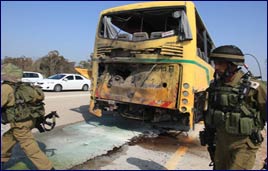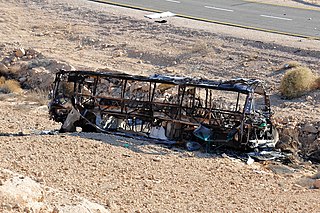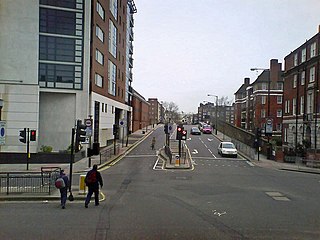Related Research Articles

A car bomb, bus bomb, van bomb, lorry bomb, or truck bomb, also known as a vehicle-borne improvised explosive device (VBIED), is an improvised explosive device designed to be detonated in an automobile or other vehicles.
Revolutionary Struggle is a Greek anarchist, anti-imperialist, urban guerrilla group known for its attacks on Greek government buildings and the American embassy in Athens. It is designated as a terrorist group by the Greek government, the European Union (EU), and the United States.
Multiple terrorist attacks have occurred in Greece.
The Afula bus suicide bombing was carried out on 6 April 1994, at a bus stop next to an Egged bus in the center of Afula, Israel. Eight Israeli civilians were killed in the attack and 55 were injured. Hamas and PIJ claimed responsibility for the attack.
This is a chronology of activities by the Provisional Irish Republican Army (IRA) from 1980 to 1989. For actions before and after this period see Chronology of Provisional Irish Republican Army actions.

The Sha'ar HaNegev school bus attack was a missile attack on 7 April 2011, in which Hamas militants in the Gaza Strip fired a Kornet laser-guided anti-tank missile over the border at an Israeli school bus, killing a schoolboy.

On August 18, 2011, a series of cross-border attacks with parallel attacks and mutual cover was carried out in southern Israel on Highway 12 near the Egyptian border by a squad of presumably twelve militants in four groups. The attacks occurred after Israel's interior security service Shin Bet had warned of an attack by militants in the region and Israeli troops had been stationed in the area. The militants first opened fire at an Egged No. 392 bus as it was traveling on Highway 12 in the Negev near Eilat. Several minutes later, a bomb was detonated next to an Israeli army patrol along Israel's border with Egypt. In a third attack, an anti-tank missile hit a private vehicle, killing four civilians. Eight Israelis – six civilians, one Yamam special unit police sniper and one Golani Brigade soldier—were killed in the multiple-stage attack. The Israel Defense Forces reported eight attackers killed, and Egyptian security forces reported killing another two.
This is a list of terrorist attacks in Pakistan in the calendar year 2011.
In 2008, Pakistan saw 40 terrorist attacks, which caused 154 fatalities and 256 injuries.
In 2009, Pakistan suffered 50 terrorist, insurgent and sectarian-related incidents that killed 180 people and injured 300.

This is a 2013 timeline of events in the Somali Civil War (2009–present).

This is a 2010 timeline of events in the Somali Civil War (2009–present).
The Provisional IRA carried out two separate attacks on the same day on 1 May 1988 against British military personnel in the Netherlands which resulted in the deaths of three RAF members and another three being injured. It was the worst attack suffered by the British security forces during The Troubles from 1969 to 1998 in mainland Europe.

This is a 2018 timeline of events in the Somali Civil War (2009–present).

The Chelsea Barracks bombing was an attack carried out by a London-based Active Service Unit (ASU) of the Provisional IRA on 10 October 1981, using a remote-controlled nail bomb. The bomb targeted a bus carrying British Army soldiers just outside Chelsea Barracks. The blast killed two civilians and injured 40 people, among them 23 soldiers.
In November 2019, six car bombings occurred in northern Syria. The bombings mostly happened in Tell Abyad and one in Al-Bab. The ISIL claimed responsibility for one, and the other five were alleged by Turkey to have been committed by the PKK.

Throughout the protracted conflict in Northern Ireland (1960s-1998), the Provisional IRA developed a series of improvised mortars to attack British Army and Royal Ulster Constabulary (RUC) security bases. The organisation also purchased both light and heavy machine guns in order to hamper the British Army supply of border bases by helicopter. The IRA fitted vehicles, specially vans and trucks, with both types of weapons. Vans, trucks and tractors were modified to transport concealed improvised mortars to a launch area near the intended target and fire them, while light and heavy trucks were employed as firing platforms mounting machine guns, particularly M60s and DShKs. Improvised armoured vehicles and heavy equipment were also used to penetrate the perimeter of fortified security bases. The IRA vehicles were often disguised as belonging to civilian companies or even government agencies.
References
- ↑ "Terrorist attacks on Americans in Greece - UPI Archives". Upi.com. Retrieved 2018-07-12.
- ↑ Anastasi, Paul (1987-04-25). "18 HURT IN BUS BOMBING NEA U.S. BASE IN ATHENS - The New York Times". Nytimes.com. Retrieved 2018-07-12.
- ↑ "10 in U.S. Air Force Hurt by Car Bomb Near Bus in Athens - latimes". Articles.latimes.com. 1987-08-10. Retrieved 2018-07-12.
- ↑ "Greece worries that terrorism will further hurt tourism". www.csmonitor.com. Retrieved 2018-07-12.
- ↑ "A explosion ripped through a Greek air force bus... - UPI Archives". Upi.com. Retrieved 2018-07-12.